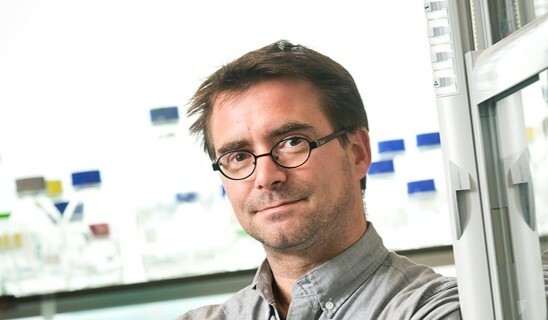On the 19th of May 2020, our dear colleague Professor Dr. Huib Ovaa passed away from prostate cancer. In the past year, Huib has undergone a variety of treatments, and has done so with his usual optimism. He continued to work as much as possible and tried to keep the burden of his fight against cancer away from the people around him. Huib was 46 years of age.
In 2004 Huib was appointed Group Leader at the Netherlands Cancer Institute (NKI-AVL), and in 2012 he was appointed Honorary Professor at the Leiden Institute of Chemistry (LIC), Leiden University. In 2017 Huib moved to the Leiden University Medical Center (LUMC) to become Professor in Chemical Biology, and where he, until his death, supervised his research group and together with Professor Jacques Neefjes, the Department of Chemical immunology. In 2018, he joined the Oncode Institute as an Oncode Investigator.
Geert Kops, Scientific Director at Oncode Institute, says: “Huib was a hugely inspiring colleague in the Oncode community. He was one of our most active members, passionately representing chemical biology in cancer research and always ready to help train future generations of scientists. We will sorely miss his enthusiastic and creative spirit. Our thoughts go out to all his loved ones.”
Huib was a highly gifted, motivated, productive and above all very creative researcher who continuously and effortlessly crossed boundaries between chemistry and biology. Indeed, such boundaries seemed not to exist for Huib in his urge to conduct inspiring and challenging breakthrough research. Huib loved to collaborate. He started many new collaborations within Oncode, participated enthusiastically in several programs and played a crucial role in the development of the Drug Repurposing Programme. Though his career was cut short prematurely, Huib’s talent, which already manifested itself during his formative years, has come to full fruition. When he started in 2004, Huib was one of the first chemical biologists in the Netherlands. In 2020 he was an international leader in this field.
Of major scientific elegance is his work from recent years: the design of chemical tools to study the enzymes that transfer ubiquitin onto proteins: ubiquitin ligases. Next to the fact that the design and development of these tools represented challenges even surpassing those for creating the ubiquitin hydrolase probes, the biomedical potential of the ligase tools is potentially enormous. Protein ubiquitylation is at least as complex as protein phosphorylation, and the corresponding ubiquitin ligase family at least as diverse as the corresponding family of phosphorylating enzymes: the kinases. The past decades have witnessed the clinical development of numerous kinase inhibitors for the treatment of various cancers. In contrast, no ubiquitin ligase inhibitors have made it to the clinic yet. Thanks to the groundbreaking work of Huib, the discovery and development of such inhibitors is now a realistic goal and in that sense the future in terms of new anticancer agents, even though too late for Huib, is bright.
Besides being a brilliant scientist, Huib was also a very enthusiastic scientist. He loved research, and he loved his colleagues within the Ovaa lab with whom he conducted his science. He maintained high standards for his students and post-doctoral researchers for whom he would walk through fire. He selected his collaboration partners with care and devoted himself and his research group unconditionally to those partners that matched his high scientific standards. He lived for his work and enjoyed his life as a scientist to the fullest. He took pride in his achievements and was proud of the people in his group with whom he achieved his successes. He was a wonderful, inspiring, loyal colleague whom we will miss dearly.
